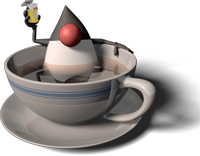-------- Begin ---------
All parameters to methods are passed "by value." In other words, values of parameter variables in a method are copies of the values the invoker specified as arguments. If you pass a double to a method, its parameter is a copy of whatever value was being passed as an argument, and the method can change its parameter's value without affecting values in the code that invoked the method. For example:
class PassByValue {
public static void main(String[] args) {
double one = 1.0;
System.out.println("before: one = " + one);
halveIt(one);
System.out.println("after: one = " + one);
}
public static void halveIt(double arg) {
arg /= 2.0; // divide arg by two
System.out.println("halved: arg = " + arg);
}
}
The following output illustrates that the value of arg inside halveIt is divided by two without affecting the value of the variable one in main:
before: one = 1.0You should note that when the parameter is an object reference, the object reference -- not the object itself -- is what is passed "by value." Thus, you can change which object a parameter refers to inside the method without affecting the reference that was passed. But if you change any fields of the object or invoke methods that change the object's state, the object is changed for every part of the program that holds a reference to it. Here is an example to show the distinction:
halved: arg = 0.5
after: one = 1.0
class PassRef {
public static void main(String[] args) {
Body sirius = new Body("Sirius", null);
System.out.println("before: " + sirius);
commonName(sirius);
System.out.println("after: " + sirius);
}
public static void commonName(Body bodyRef) {
bodyRef.name = "Dog Star";
bodyRef = null;
}
}
This program produces the following output:
before: 0 (Sirius)Notice that the contents of the object have been modified with a name change, while the variable sirius still refers to the Body object even though the method commonName changed the value of its bodyRef parameter variable to null. This requires some explanation.
after: 0 (Dog Star)
The following diagram shows the state of the variables just after main invokes commonName:
______________
main() | |
sirius------->| idNum: 0 |
| name --------+------>"Sirius"
commonName()----->| orbits: null |
bodyRef |______________|
At this point, the two variables sirius (in main) and bodyRef (in commonName) both refer to the same underlying object. When commonName changes the field bodyRef.name, the name is changed in the underlying object that the two variables share. When commonName changes the value of bodyRef to null, only the value of the bodyRef variable is changed; the value of sirius remains unchanged because the parameter bodyRef is a pass-by-value copy of sirius. Inside the method commonName, all you are changing is the value in the parameter variable bodyRef, just as all you changed in halveIt was the value in the parameter variable arg. If changing bodyRef affected the value of sirius in main, the "after" line would say "null". However, the variable bodyRef in commonName and the variable sirius in main both refer to the same underlying object, so the change made inside commonName is visible through the reference sirius.
Some people will say incorrectly that objects are passed "by reference." In programming language design, the term pass by reference properly means that when an argument is passed to a function, the invoked function gets a reference to the original value, not a copy of its value. If the function modifies its parameter, the value in the calling code will be changed because the argument and parameter use the same slot in memory. If the Java programming language actually had pass-by-reference parameters, there would be a way to declare halveIt so that the preceding code would modify the value of one, or so that commonName could change the variable sirius to null. This is not possible. The Java programming language does not pass objects by reference; it passes object references by value. Because two copies of the same reference refer to the same actual object, changes made through one reference variable are visible through the other. There is exactly one parameter passing mode -- pass by value -- and that helps keep things simple.
-- Arnold, K., Gosling J., Holmes D. (2006). The Java™ Programming Language Fourth Edition. Boston: Addison-Wesley.
-------- End ---------
Source: http://forum.java.sun.com/thread.jspa?threadID=719862&messageID=4155502
